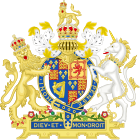
Back عريضة الحقوق Arabic Petition of Right German Petición de Derechos Spanish Pétition des droits French Achainí um Chearta (1628) Irish A Jog Kérvénye Hungarian Petition of Right ID Petition of Right Italian 権利の請願 Japanese 권리청원 Korean
| Act of Parliament | |
 | |
| Long title | The Petition Exhibited to His Majestie by the Lordes Spirituall and Temporall and Commons in this present Parliament assembled concerning divers Rightes and Liberties of the Subjectes: with the Kinges Majesties Royall Aunswere thereunto in full Parliament.[2] |
|---|---|
| Citation | 3 Cha. 1. c. 1 |
| Introduced by | Sir Edward Coke |
| Territorial extent | England and Wales |
| Dates | |
| Royal assent | 7 June 1628 |
| Commencement | 7 June 1628 |
Status: Amended | |
| Revised text of statute as amended | |
| Petition of Right | |
|---|---|
 The Petition of Right | |
| Created | 8 May 1628 |
| Ratified | 7 June 1628 |
| Location | Parliamentary Archives, London |
| Author(s) | Sir Edward Coke |
| Purpose | The protection of civil liberties |
| Full text | |
The Petition of Right, passed on 7 June 1628, is an English constitutional document setting out specific individual protections against the state, reportedly of equal value to Magna Carta and the Bill of Rights 1689.[3] It was part of a wider conflict between Parliament and the Stuart monarchy that led to the 1639 to 1653 Wars of the Three Kingdoms, ultimately resolved in the 1688-89 Glorious Revolution.
Following a series of disputes with Parliament over granting taxes, in 1627 Charles I imposed "forced loans", and imprisoned those who refused to pay, without trial. This was followed in 1628 by the use of martial law, forcing private citizens to feed, clothe and accommodate soldiers and sailors, which implied the king could deprive any individual of property, or freedom, without justification. It united opposition at all levels of society, particularly those elements the monarchy depended on for financial support, collecting taxes, administering justice etc, since wealth simply increased vulnerability.
A Commons committee prepared four "Resolutions", declaring each of these illegal, while re-affirming Magna Carta and habeas corpus. Charles previously depended on the House of Lords for support against the Commons, but their willingness to work together forced him to accept the Petition. It marked a new stage in the constitutional crisis, since it became clear many in both Houses did not trust him, or his ministers, to interpret the law.
The Petition remains in force in the United Kingdom, and parts of the Commonwealth. It reportedly influenced elements of the Massachusetts Body of Liberties, and the Third, Fifth, Sixth and Seventh amendments to the Constitution of the United States.
- ^ The citation of this Act by this short title was authorised by section 5 of, and Schedule 2 to, the Statute Law Revision Act 1948. Due to the repeal of those provisions, it is now authorised by section 19(2) of the Interpretation Act 1978.
- ^ These words are printed against this Act in the second column of Schedule 2 to the Statute Law Revision Act 1948, which is headed "Title".
- ^ Flemion 1973, p. 193.